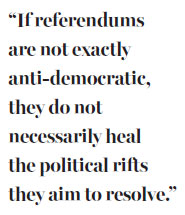Referendums aren't the solution
Updated: 2016-10-07 07:48
By Harvey Morris(China Daily Europe)
|
|||||||||
As Britain has found, giving every voter a say on individual policy matters can divide as much as unite a country
"I think referendums are fundamentally anti-democratic in our system, and I wouldn't have anything to do with them."
That was Chris Patten, the last British governor of Hong Kong, speaking in an interview more than a decade ago against proposals for a referendum on his country's future relationship with the European Union.
Patten's argument was that, on the whole, governments only agree to hold referendums when they are weak in the face of issues that divide electorates.

A recent series of popular votes in Western democracies appear to bear out the argument that, if referendums are not exactly anti-democratic, they do not necessarily heal the political rifts they aim to resolve.
On Oct 2, voters in Colombia decided by the narrowest margin to reject a peace deal signed only days earlier to end a half-century of civil war between the state and left-wing FARC guerrillas. In a referendum in which less than four in 10 of the electorate voted, there was less than a 1 percentage point between the "yes" and "no" tallies.
Although President Juan Manuel Santos insists a bilateral cease-fire remains in place, he will now have to send his officials back to the negotiating table to try to hammer out a revised deal with the guerrilla movement.
Halfway across the world on the same day, Hungarians went to the polls in a referendum to decide their country's policy on any decision by the EU, of which it is a member, to require Hungary to take a quota of migrants from the Middle East and elsewhere who have headed to Europe's shores.

An overwhelming 99.3 percent of the 3.3 million who voted supported a call by the government of Prime Minister Viktor Orban to reject the EU plan. Only 55,000 voters supported it.
The problem is that the overall turnout fell shy of the 50 percent-plus-1 threshold required. That left Orban proclaiming victory at the same time as Hungary's National Election Office was declaring the referendum result invalid.
Questions about the validity of the very concept of referendums within parliamentary democracies have multiplied since British voters opted in a June 23 vote to leave the EU, of which the UK has been a member for 43 years. Of the seven out of 10 of the electorate who exercised their right to vote, 51.9 percent opted for so-called Brexit.
In the complex negotiations that will follow, it is now up to a politician who campaigned to stay in the EU, Prime Minister Theresa May, to fulfill the promises of colleagues who voted to leave.
Foreign puzzlement about the British choice in the immediate aftermath of the vote was widespread, with, for example, the Global Times newspaper in China noting that: "For the Chinese people, who are at a critical time to learn about globalization and democracy, they will continue to watch the consequence of Britain's embracing of a 'democratic' referendum."
Pro-EU voters still smarting from the outcome of the relatively narrow result might well agree with Chris Patten, who reprised his anti-referendum views on the day after the June 23 poll, by writing that "a referendum reduces complexity to absurd simplicity".
The former Conservative politician, who followed his Hong Kong governorship with five years as the EU's external affairs commissioner, wrote of the Brexit campaign, "The tangle of international cooperation and shared sovereignty represented by Britain's membership of the EU was traduced into a series of mendacious claims and promises."
He and other constitutionalists argue that referendums have historically been a tool of dictatorships seeking to legitimize their rule and that they have no routine role in Western democratic systems. Under parliamentary systems prevalent in Europe, voters choose parties on the basis of competing political platforms and leave it up to the winners to put their policies into practice. Elected politicians are meanwhile committed to representing all their constituents, not just those who voted for them.
Some reformists claim it is a system that denies grassroots democracy, and that referendums allow everyone an opportunity to decide major issues.
But as the British, Colombian and Hungarian votes illustrate, giving every voter a say on individual policy matters can divide a country as much as it unites it. If voters do not turn out on the day - for lack of enthusiasm, failure to understand the issues, or maybe just because the weather was bad - minorities can end up making decisions for a whole country, while governments that had hoped for a quick-fix referendum solution are left to pick up the pieces.
The author is a veteran correspondent with spells at Reuters, the Independent and the Financial Times, and has extensive knowledge of the Middle East. The views expressed do not necessarily reflect those of China Daily.
(China Daily European Weekly 10/07/2016 page11)
Today's Top News
Theresa May shifts her party toward the center
Security Council agrees on Guterres as next UN chief
Rudd says immigration speech not racist
West may be best for nation's teenagers
Trio wins Nobel chemistry prize for 'nano machines'
IMF sees Brexit damage to British growth
Three scientists share 2016 Nobel Prize in Physics
BRICS need to find their purpose again: O'Neill
Hot Topics
Lunar probe , China growth forecasts, Emission rules get tougher, China seen through 'colored lens', International board,
Editor's Picks

|

|

|

|

|

|







